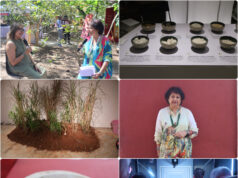For those fascinated with expensive and not-too-easily available cold-pressed oils, the humble ghee, a form of clarified butter that originated in the Indian subcontinent, is a great substitute that is more easily accessible and more gut-friendly, according to Chef Aditya Raghavan.
Raghavan was a resource person at an interactive workshop that explored the connection ghee shares with our ancient heritage, as part of the culinary segment at the sixth edition of the Serendipity Arts Festival (SAF) which got underway in Panaji on Friday.
At the workshop titled ‘Ghee and Our Connection with Our Ancestors’, which was held soon after the inauguration of the latest edition of South Asia’s largest multidisciplinary art event, Raghavan also said that because ghee is high in fatty acids and vitamins, it is easily assimilated into our body due to its compatibility with the human gut biome.
The interactive workshop was held as part of the SAF’s Culinary Arts discipline and was curated by Chef Thomas Zacharias and The Locavore Team.
“A good source of fat, I would say ghee is a better choice because it is easier to find good ghee than a good oil in India. Oil is a commodity produced on a large scale, so there are chances that it might not be prepared well, whereas good ghee is produced carefully in controlled quantities, making it a healthier option,” said Raghavan.
Raghavan stated that the domestication of cattle by our ancestors led to an abundance of milk production per family unit. However, India’s hot climate resulted in the necessity of boiling milk for safe consumption, which eventually led to the production of ghee.
“The raw milk culture was previously prevalent in Europe and is still celebrated. Before Louis Pasteur invented the pasteurisation process, people were unaware that raw milk could potentially sicken humans due to the presence of certain harmful bacteria. However, the colder European climes made raw milk consumption safer, unlike in India,” said Raghavan.
As ghee is primarily derived from yoghurt, the fermentation process is our key connection with our ancestors, with Raghavan stating that “fermentation is a key part of everyone’s collective heritage”.
According to Prahlad Sukhtankar, who was the curator of the Culinary Arts discipline for the Serendipity Arts Festival in 2022, while there is a prevalent perception that ghee is fattening and unhealthy, this is false and it ought to be utilised by more high-end restaurants instead of oil.
“Restaurants are always a reflection of society. Products that are marketed well by the West are usually accepted into mainstream Indian culture, an unfortunate result of the colonial hangover,” said Sukhtankar.
“Regional ingredients are always much healthier, as our bodies are naturally inclined towards assimilating the nutrients efficiently. Hence, there is a need for more boutique restaurants to establish connections with regional producers of ghee and incorporate it into their menus. We need to be proud of our heritage and food,” said Sukhtankar, who is also head of the National Restaurant Association of India (NRAI) – Goa Chapter.






